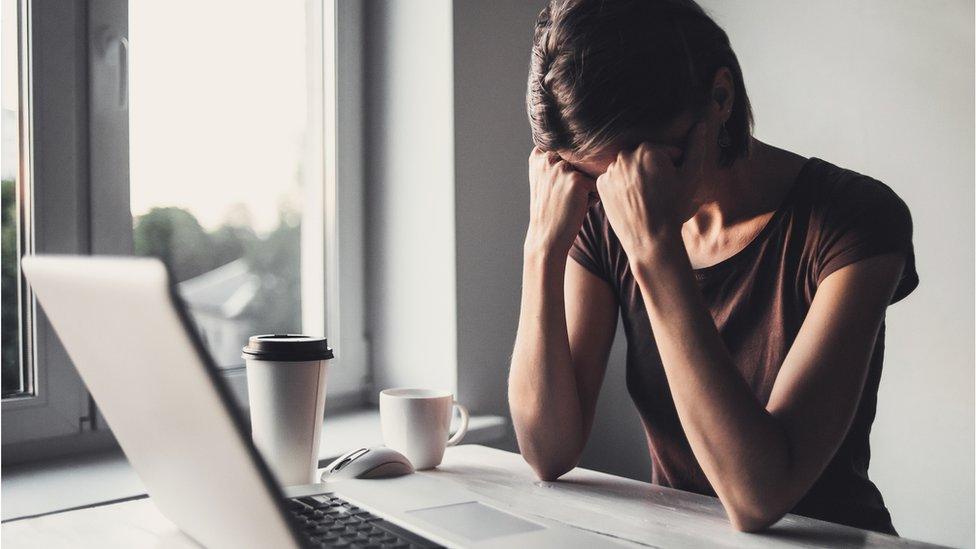'My sister took her life, petrified at facing her ex in court'
- Published
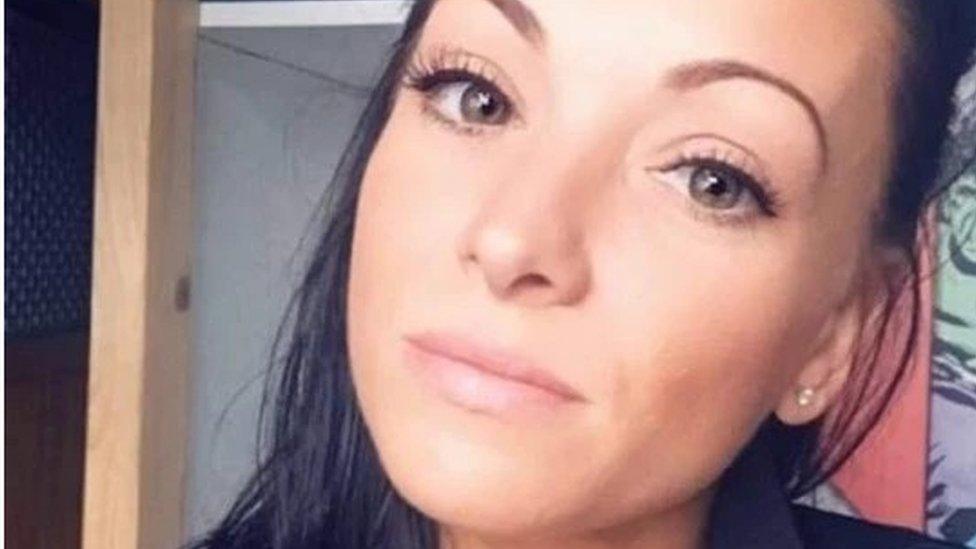
Last year, Gemma Robinson, 34, took her own life just days before she was due to face her abusive ex-partner in court. Here her family speak about what led to Gemma's death in the hope that it may help other people living in abusive relationships.
When Damian Wilson hugged his sister Gemma as he prepared to fly to Cambodia in September 2019, she broke down in tears.
Becoming emotional when her brother returned to the Southeast Asian country, where he had been living for almost five years, was nothing out of the ordinary. But then Gemma whispered something in his ear that concerned him.
"I'm really not doing okay," she told him.
"That was the first time she'd ever done that," Damian recalls. "I remember thinking: 'She really means that.'"
He reassured her that he'd be back soon and told her to "hang in there".
But that was the last time Damian saw his sister.

Growing up in London, Gemma Robinson was popular, loud and "loved being the centre of attention".
"She had bundles of life," Damian remembers, and was rarely happier than when on the dance floor with her friends and sister Kirsty.
"She was the life and soul of the party, we were dancing partners," Kirsty says.
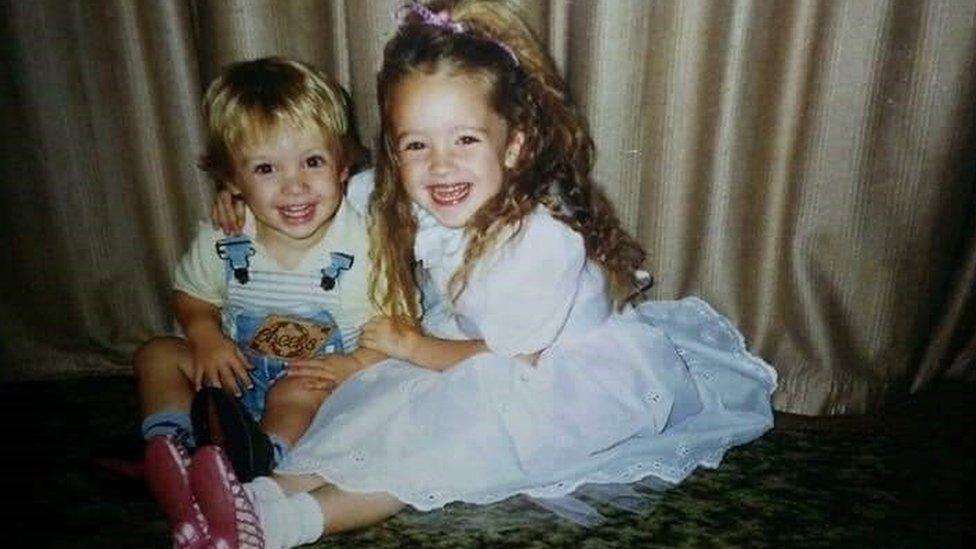
Gemma, with her younger brother Damian as children
As she got older, Gemma was the person many people turned to if they had a problem, Damian recalls.
"If someone was going through a breakup or if there were issues with family, she was always there for her friends. No matter what she was going through, she always put it aside and dealt with the people that needed her," he says.
"I think that was one of her problems. She wouldn't focus on herself, she was always focusing on other people."
Gemma became a mother to her son at the age of 20, and had her daughter five years later. Her family say she loved becoming a mother and found a career as a pole fitness instructor. Everything seemed to be falling into place.
But things started to unravel for her around six years ago. She became a single mother after splitting up with the father of her children, and then started experiencing severe back pain, which meant she couldn't do the job she loved.
"When you're in those circles and in quite a self-destructive mode… you end up surrounding yourself with people who are not the best," Damian says.
It was around this time she met Joe Falconer.
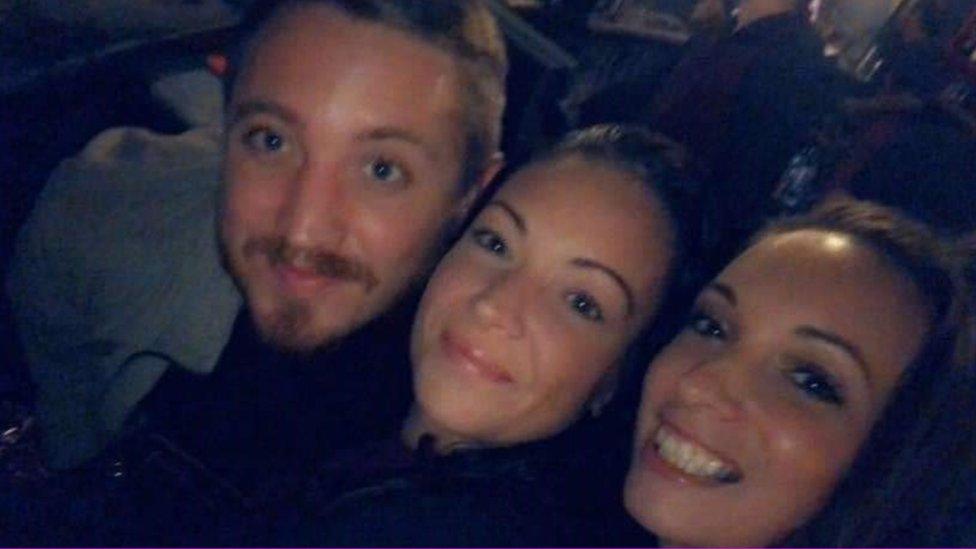
Damian (left) and Kirsty (right) said they could see their sister becoming more withdrawn
Gemma met Falconer at a pub in Bexley, south-east London.
"We all met him individually at different times. Me, my dad and other members of the family, we were like: 'We're not too sure of him'. That was our first reaction," Kirsty says. "If you were to speak to him he wouldn't even look at you directly in the eyes."
Damian had a similar impression: "I never liked him, but I knew she was in love with him so I tried."
But it wasn't long until Falconer's behaviour started to become controlling.
"You could tell Gemma was becoming a bit withdrawn, not really being herself. You could see something wasn't right," Kirsty says.
He would increasingly stop her from seeing her friends, Kirsty says, and on nights out, Falconer would stare at other men and pick arguments with Gemma.
Gemma didn't report the first time he attacked her, Kirsty says. But the second time she did.
Falconer had smashed up Gemma's house in a jealous rage and pinned her up against a wall. She was moved into a safe house while Falconer waited for his court date.
But when the case came to court, Gemma told her family that her address was read out in front of Falconer during the hearing.
"I don't know why they did that, it's just ridiculous. She's going to this safe house for a reason," Kirsty says.
Falconer was convicted of battery and criminal damage and was given a restraining order preventing him from contacting Gemma, but he turned up at her address and persuaded her to let him in. She agreed to allow him to sleep on the sofa and he claimed he was suffering from post-traumatic stress disorder.
Around a month later he attacked Gemma again.

Gemma had been at a friend's house and had decided to stay the night as her children were with her parents. Falconer started sending abusive messages, accusing her of being with another man.
He called and texted her more than 70 times over the night, before apologising, making Gemma believe it was safe to return home in the morning.
As she opened the front door and walked up the stairs, Falconer jumped out at her and waged a brutal attack.
"He grabbed her left arm, dragged her into the bathroom and pushed her into the shower cubicle," Prosecutor Vivian Walters read in court.
He pushed into her neck making it difficult for her to breathe and punched her repeatedly in the face, the prosecutor added.
After he left Gemma managed to make it to her living room where she was spotted by a neighbour, who called an ambulance.
Falconer was arrested three days later.
'She was petrified'
After leaving hospital, Gemma went to live with Kirsty while she recovered from a fractured eye socket. But Kirsty says her sister was never the same again.
"From that morning he attacked her, she was a completely different person. I just saw my sister become a complete shell of herself. She was just petrified," Kirsty says.
"She was crying at night, I'd have to go in and cuddle her. She was so nervous. Any loud noise she would jump, any loud noise of a man's voice, she'd jump."
Gemma was then moved to another safe house.
Soon after she started receiving support from a Kent-based company called Choices. Kirsty says Gemma was upset when she was told the phone calls were to end.
"That really upsets me because I just feel like maybe we might not be here if she had that support, because she needed it," Kirsty says.
Choices told the BBC they could not comment while a "domestic homicide review" is conducted.
Things started to spiral for Gemma as the country went into lockdown. She started to drink heavily in an effort to numb the pain and was suffering from nightmares of the attack.
In July, Gemma took her own life at the age of 34. She had been due to face Falconer in court a few days later.

Damian, who was in Cambodia, received a call from his mother.
"That was just heart-wrenching. I got the next flight out," he says.
"I know she had decided she couldn't see any way of life being happy. Especially being such a devoted mum, even the thought of leaving her kids wasn't enough to make her stay with us. I think she'd had years and years of torture … and I think Joe maybe tipped her over the edge," he says.
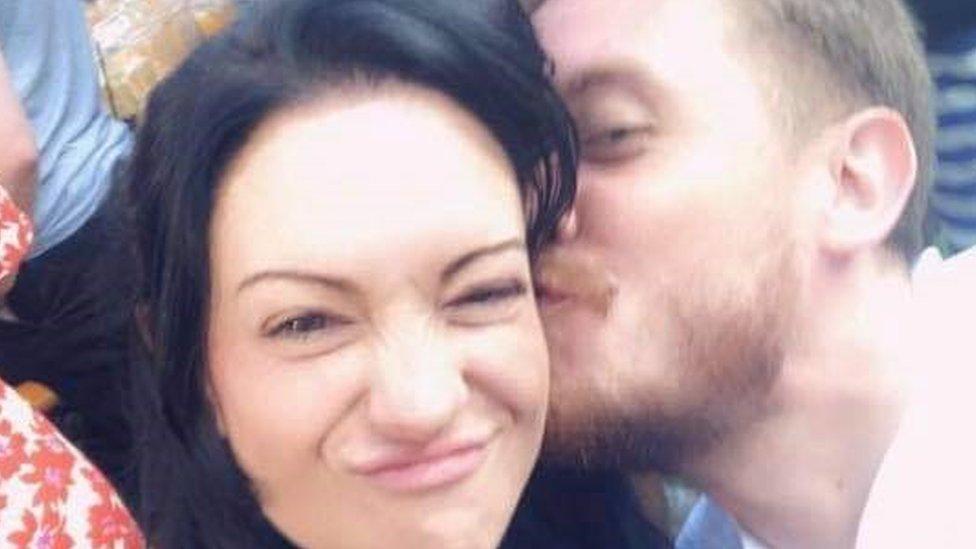
Damian believes the idea of facing her abuser in court was too much for Gemma
"I only found this out after Gemma had died - she had told Kirsty and her best friend that she still loved him," Damian says.
"When you love someone that much, the pain you feel, it's like nothing you've ever felt. Add on top of that the fact this person you love beat the crap out of you and abused you mentally, and then you're going to have to face them in court to put them in prison, that's got to mess anyone up."
Lucy Hadley, head of campaigns and policy at charity Women's Aid, says around 30 women take their own life every week, many of whom have experienced domestic violence.
"The level of fear it takes to report domestic abuse and then to pursue someone you loved and trusted, who had that level of control over you for years or decades, and to take them to court, is a huge thing," she says.
"Without the right support, without specialist domestic abuse support throughout that process, it's a really terrifying and difficult experience and can expose them to more risk, as in this case."
"Far too often, for far too many victims, the support isn't there."
The family's grief was compounded by Falconer's sentencing in February.
He denied inflicting grievous bodily harm (GBH) with intent and pleaded guilty to the lesser charge of inflicting grievous bodily harm and criminal damage.
He was jailed for three years and four months, but was recently released on tag due to time spent on remand. Kirsty said she was "completely devastated" when she learned of his release.
"It just makes people think it's okay to do this if they're giving away such light sentences," Kirsty says.
Damian hopes Gemma's story will reach other victims of domestic abuse.
"I imagine Gemma reading her own story and recognising she's in that same situation … maybe that changes her mind. Maybe she goes: 'There are avenues of help,'" he says.
"If anyone is in the same situation as Gemma, maybe they can find some solidarity and find a positive future.
"One person would be enough. It'd be worth it."
If you, or someone you know, has been affected by domestic abuse or violence you can contact the BBC Actionline for information and support.
Related topics
- Published25 February 2021
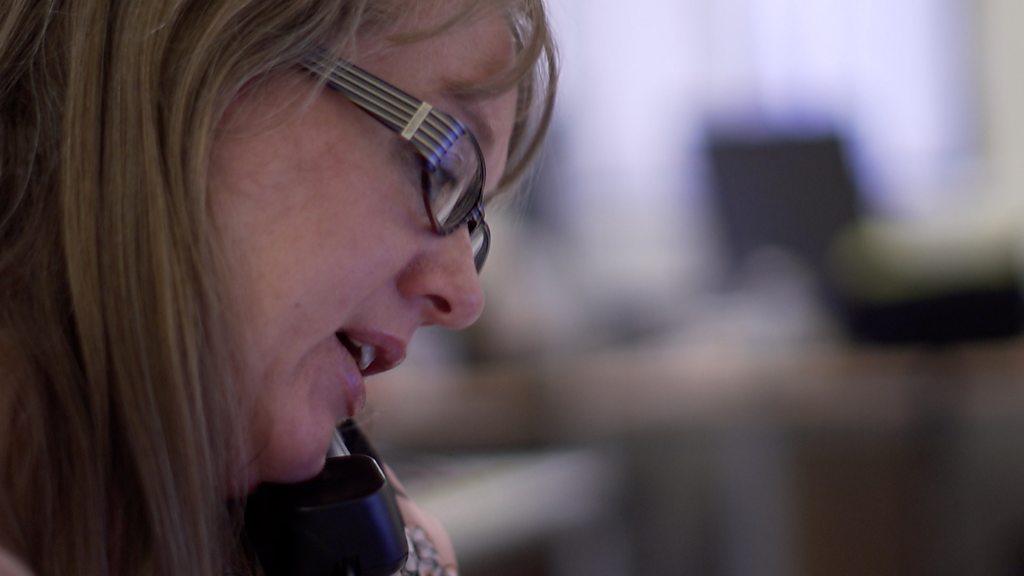
- Published7 January 2021
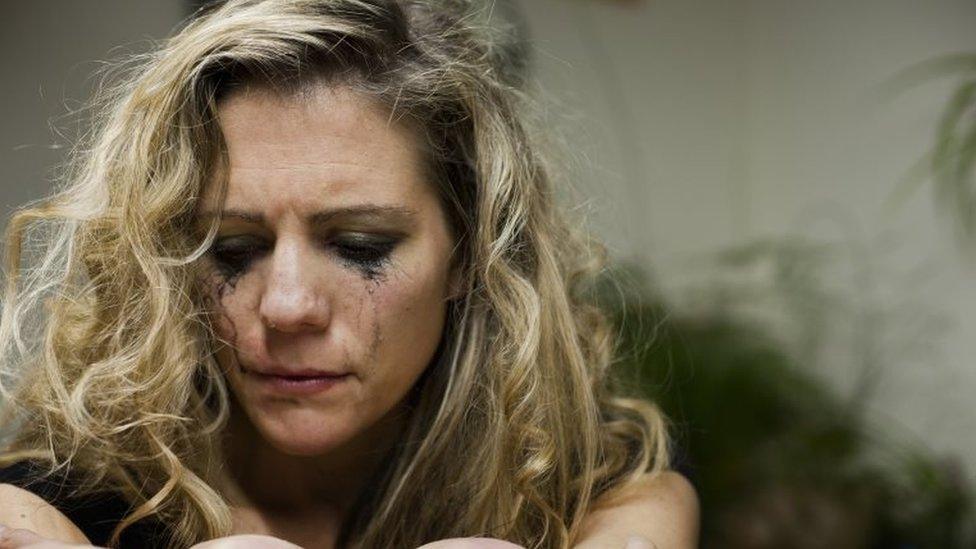
- Published23 March 2021
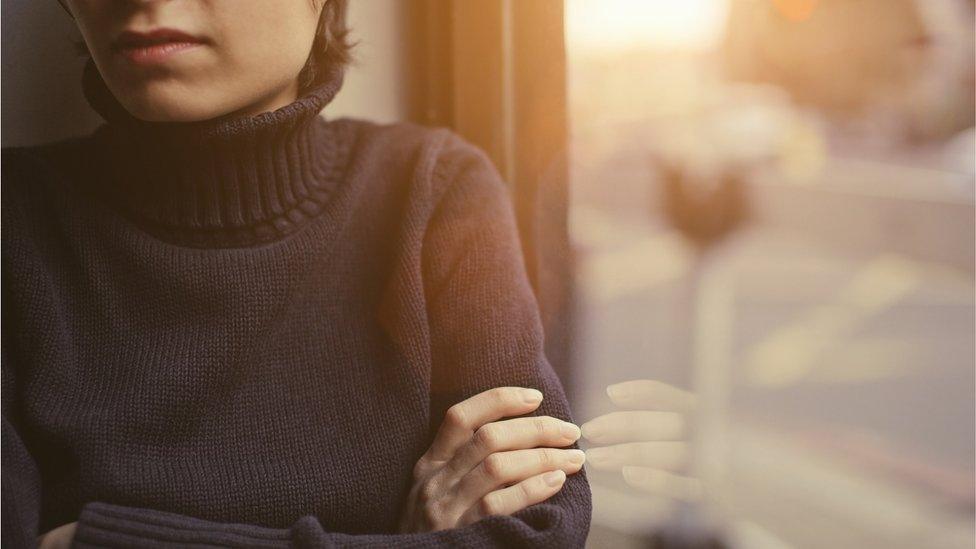
- Published14 January 2021
